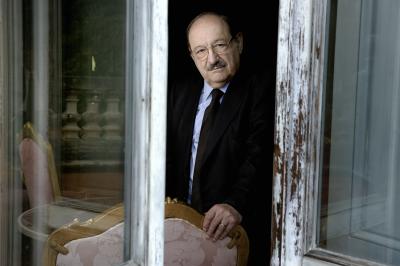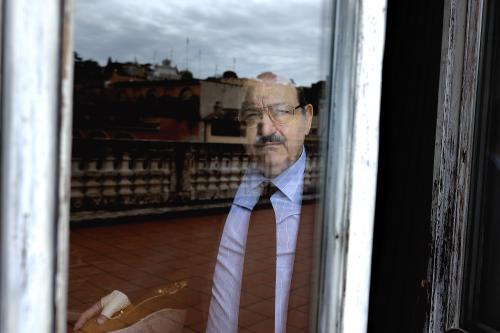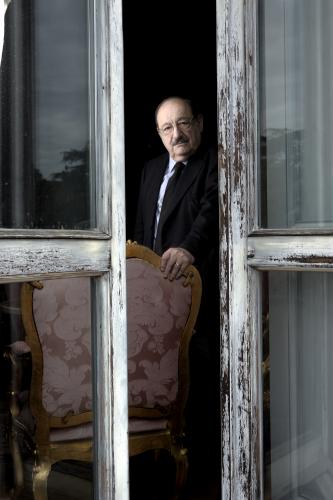Obituary: Italian author and semiotician Umberto Eco

The great Italian novelist and intellectual Umberto Eco, died at the age of 84, after shooting to stardom with his bestselling medieval detective novel The Name of the Rose in his middle years, and founding the communications department at the University of San Marino amongst many other achievements. Eco never saw himself as an author, famously saying, “I am a philosopher. I write novels only on the weekends.”
Philosopher though he may have been, Eco did not lock himself away from the new – he was a whiskey-drinker, a cigarette smoker, an accomplished journalist, adored popular culture, was able to laugh at himself freely despite taking himself reasonably seriously, and was fascinated by the world around him, “I have come to believe that the whole world is an enigma, a harmless enigma that is made terrible by our own mad attempt to interpret it as though it had an underlying truth.” Whilst he left the Catholic Church in the early 1950s, it was this that he believed opened his eyes to the world, “When men stop believing in God, it isn’t that they believe in nothing: they believe in everything,” he said.
His final work – the release date for which has been brought forward following his death and will come out on February 27 in Italian, rather than May as planned – is a collection of his essays that have previously been published in L’Espresso, a weekly Italian magazine, and entitled Papé Satàn Aleppe: Chronicles of a Liquid Society.
Born in Alessandria in the region of Piedmont in 1932 to Giulio Eco, one of thirteen children and an accountant before he was drafted in to fight in three wars, and Giovanna Bisio, with whom Umberto moved a small Piedmontese village during the Second World War. He received a Salesian education, making many references to this order of monks and their founder throughout his works, as well as in interviews. Whilst his father was keen for him to read Law, he decided to go against these wishes and enrolled at the University of Turin, where he dedicated himself to studying medieval philosophy and literature. Upon graduation he took up a job as cultural editor at the state broadcasting station RAI, as well as lecturing at his old university. In September 1962 he married a German art teacher, Renate Ramge, with whom he had two children – a son and a daughter
‘The Name of the Rose’ was not published until 1980, when he was already a professor of semiotics at the University of Bologna, where he would later go on to become professor emeritus and chairman of the Higher School of Humanities. The book was written at the request of an Italian publisher who was looking to publish a series of short thrillers and, whilst Eco had a fondness for writing literary spoofs, he said that he accepted because “he felt like poisoning a monk.” The adaptation to screen of the novel in 1986, which starred Sean Connery, sealed his fame, and his subsequent novels Foucault’s Pendulum, which was described as a “thinking man’s Da Vinci Code”, and Baudolino were almost as successful.
Of course, not everyone enjoyed Eco’s works and he received a great deal of criticism from various angles. His review of Foucault’s Pendulum by the newspaper of the Holy See condemned the novel, claiming it was “full of profanations, blasphemies, buffooneries and filth, held together by the mortar of arrogance and cynicism,” and they were not the only ones. Another critic went so far as to say that the main appeal of his work for a reader is the humiliation he feels for his own ignorance, which translates into a naïve admiration of his pyrotechnics. When asked about this particular quote in an interview with the Paris Review Eco responded, “Am I a sadist? I don’t know. An exhibitionist? Maybe. I am joking – Of course not! I have not worked so much in my life in order just to pile knowledge before my readers. My knowledge quite literally informs the intricate construction of my novels. Then it is up to my readers to detect what they might.” Later he expanded by saying, “I always assume that a good book is more intelligent than its author. It can say things that the writer is not aware of.”
A high-powered intellectual he collected honorary degrees from universities around the world and, whilst he wrote half a dozen novels, his works on semiotics, critical theory and aspects of philosophy (he was particularly keen on medieval philosophy and regarded the Middle Ages as a fruitful time) were almost ten times that amount, despite once saying that any idea you have might not be original, “Aristotle will always have thought of it before you.”
His funeral service was held in Milan at Castello Sforzesco on February 23 and the number of people who attended proved the Minister for Education Stefania Giannini’s statement true when she said, “Eco is a symbol of this innovative classicism of which we have a huge need and for which our country is a herald for this world. We have lost a maestro but we haven’t lost his lessons.”
In the postscript to The Name of the Rose Eco states that it was Bernard of Morlay’s poem De Contemptu Mundi that inspired both the title and the last line. Whilst for the Benedictine monk the meaning was that in this imperfect world, the only imperishable things are ideas, for Eco the “empty name” has a more indefinite semiotic sign. A rose is a symbol that is so rich in meaning that it now means everything and nothing; therefore readers can draw their own interpretations. A fitting way to say goodbye to this great man therefore: “Stat rosa pristina nomine; nomina nuda tenemus.” [Yesterday’s rose endures in its name; we hold empty names.]
Umberto Eco, born January 5 1932, died February 19 2016.
ch




